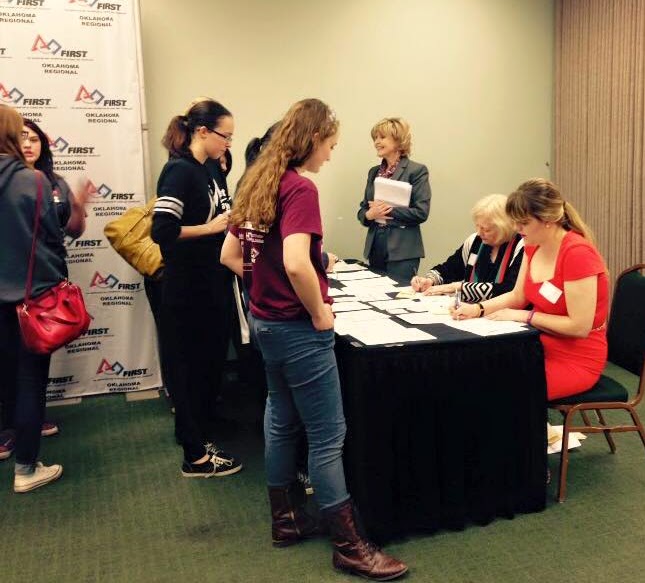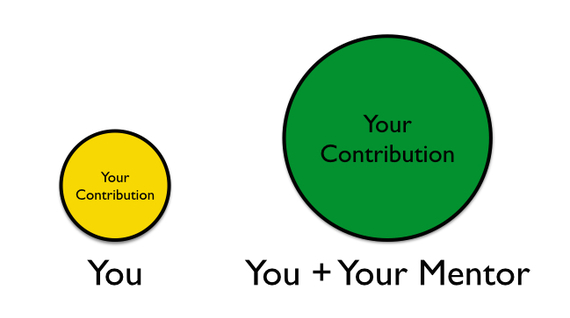 For Oklahoma FIRST Robotics Competition 2015, in which robotics teams from Arkansas, Kansas, Missouri, Texas and Oklahoma fought with brains, metal, and electronics, Oklahoma women engineers organized a Women In S.T.E.M. Reception. Approximately 32 engineers came to table-mentor. Three made presentations, which showed how creative and challenging a future is ahead for women engineers. On a smaller scale, this mentoring model can be hosted all over Oklahoma.
For Oklahoma FIRST Robotics Competition 2015, in which robotics teams from Arkansas, Kansas, Missouri, Texas and Oklahoma fought with brains, metal, and electronics, Oklahoma women engineers organized a Women In S.T.E.M. Reception. Approximately 32 engineers came to table-mentor. Three made presentations, which showed how creative and challenging a future is ahead for women engineers. On a smaller scale, this mentoring model can be hosted all over Oklahoma.  |
| Registration: Smart girls, girls, girls... Woodrome; Wollmershauser, P.E.; Crissup, P.E. |
Beginning of the Reception
In March 2014, Harold Holley, director of Oklahoma Robotics, asked the Society of Women Engineers to host
the reception. SWE invited the Oklahoma Engineering Foundation, Tulsa Engineering Foundation, and Tulsa Regional STEM Alliance to co-sponsor the first event last year. Harold, who had observed the event at the Texas Regional
Competition, wanted the same interaction to happen in Oklahoma. Thus he talked to Barbara Wollmershauser.
Girls on FIRST
Robotics Teams may not have many opportunities to meet women engineers. This special event provides contact, interaction, and inspiration.Last year,80 young robotics competitors and 31 women engineers enjoyed meeting.
We don't have this year's numbers yet.
 |
| Fruit, chips, queso, salsa, tea and lemonade |
 |
| 'So many robotics competitors that tables had to be added! |
Opening Remarks
Xan Black's opening was so powerful that we post it so you can share and inspire.
 |
| Xan Black begins the program |
"I’d like to tell you about a
very strong woman named Sonia Kovalevsky. She was born in 1850 in Moscow. As time went by, her parents decided to remodel their home. Since there
was no Pinterest – what could they do? When making wallpaper selections, they decided
to take Sonia’s uncle’s calculus book apart and use the pages to paper young
Sonia’s bedroom walls. She recalls spending her early childhood working
to understand the calculus that papered her bedroom walls and to figure out the
original order of the pages. So now you know what you need to do when you
are a mom – paper the kids walls with a calculus or physics book and all
will be well!
Those early years had a profound
effect on Sonia Kovalevsky. She became not only interested, but very
talented in mathematics. Alas, in Russia at that time, women could not
attend University. So Sonia decided to leave Russia. Another hurdle
was that in order to travel abroad, Russian women had to have written
permission from their father or their husband. So what could Sonia do?
She married! She married Mr. Kovalevsky, a young paleontologist who later
worked with Charles Darwin! The young Kovalevsky’s moved to Germany where
Sonia was able to enroll at the University [of Heidelberg]. She was not, however, allowed
to enroll in classes – she could only audit them. [Later in Berlin where she was not allowed to audit classes,] she paid
friends to take the classes she wanted to study and then share notes with
her. Sonia Kovalevsky overcame all of these odds and became the first
woman to receive her PhD in Mathematics and is noted for her work in
Differential Equations.
Fast-forward 100 years from the
time of Sonia’s work and you will be in the time frame when I was pursuing a
degree in Petroleum Engineering. I didn’t have to pay anyone to attend
classes for me, although I was definitely tempted to do so on more than one
occasion! We didn’t have any struggles of the magnitude that Sonia faced, but
we did face our own challenges! I recall being either the only female or
one of two or three girls in all of my classes. The other students and
faculty were largely supportive, but not entirely so! I remember one
occasion when our Society of Women Engineers group was invited to attend an
engineering banquet. Our advisor recommended that we dress “like guys” – wear
pants and a shirt. They told that to the WRONG one! I wore my
frilliest peach dress with ruffles on the shoulders that stood above my
ears! I do not and did not surrender my gender to become an engineer!
In closing, I have been very
inspired by a quote from Sonia Kovalevsky and hope that you will find it
encouraging as well:
'Say what you know, do what you
must, come what may.'
Say what you know – you don’t
have to pretend to know things that you don’t – but you dare not hold back on
saying what you do know!
Don’t be a shrinking violet – stand up and say
what you know!
Do what you must – you may need
to get up early, stay late, get to be best friends with Khan Academy, or join
the stinky geek study group! Whatever it takes – do what you must!
Our country, state and region are depending on you to do that!
Come what may – Once you have
your mission, don’t let anyone or anything stop you!
Don’t avoid taking
risks because you don’t know how things are going to turn out.
Step out
and step up – start today – COME WHAT MAY!"
.jpg) |
| Chickasha OK Team 3931 |
 |
| Robotics competitors at the reception |
 |
| Reception-goers looking at their free copy of Celeste Baine's "Is There an Engineer Inside You?" |
Baine's reader-friendly book, being perused above, is available through PDF also.
http://www.engr.utk.edu/futurestudents/pdf/Is_There_An_Engineer_Inside_You_UTK.pdf
 |
| Listening and eating |
Before reading the next post about the reception, learn more about the competition below.
 |
| In the robotics competition "pit" are Barbara Wollmershauser, P.E., and Xan Black, P.E., and
Program Director,
Tulsa Regional STEM Alliance
|
Oklahoma Regional and FIRST
Since 2007, the annual Oklahoma FIRST Regional has been held at the Cox Convention Center in Oklahoma City. Teams from across the country compete in the robotics competition designed to pair professionals and young people to solve an engineering design problem and compete.
FIRST, which stands for “For the Inspiration and Recognition of Science and Technology,” is a nonprofit organization founded in 1989 by Dean Kamen. Kamen is an inventor, entrepreneur, and a strong promoter of science, technology, and engineering. He is best known as the inventor of the Segway. Kamen noticed that the number of American students in the science and technology field was widely decreasing and he wanted to inspire young adults to join the vast field of science and technology.
http://www.oklahomafirst.org/ Ret. 3-27-15


.jpg)


